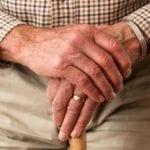90% of Australian women* report that the way they feel about their body sometimes stops them from partaking in every day activities. They cancel plans and skip social gatherings based on how they look. 70% of women of a healthy weight wish they were thinner.[1] 80% of 10 year old girls list ‘being overweight’ as one of their biggest fears.[2] These statistics represent the majority of women in your church and family. It might represent you—it certainly represents me. Daughter of God, sister of Christ, there are plenty of people who have opinions about your body. But, what does the the Bible have to say? Read on, and I promise I won’t quote Psalm 139.
Created Unashamed
Adam and his wife were both naked, and they felt no shame. (Genesis 2:25)
The first thing that the Bible has to say about human bodies is that they are no accident. God made them, and they were good. Adam and Eve’s flesh was no cause for embarrassment: they were naked and unashamed. We can be sure that Eve did not waste one minute of her time in the Garden worrying about how she looked. She wasn’t critical of her stomach or her thighs. She rejoiced in the body God had made and used it to work for him. The Genesis account tells us that God created humans in his image, and likeness. Flesh was (and is) God’s chosen image-making material.
Broken Body, Disordered Mind
Eve was the last woman to experience unbroken body-image. She was the last woman to see her body outside of the shadow of sin. In Genesis chapter two, Eve listens to the serpent and not to God, sin enters the world. Note, the first consequence of sin is broken body-image. Adam and Eve realise they are naked and feel ashamed. They cover themselves. Imagine Eve squirming in her fig-leaf, sucking in her stomach and pinching her upper arms. She is dissatisfied. ‘Am I ugly?’, she wonders for the first time. Sin affected Eve’s physical body, made it mortal. The moment she turned her back on God the life-giver, pain, disease and death embedded themselves in her DNA.
Imagine Eve squirming in her fig-leaf, sucking in her stomach and pinching her upper arms. She is dissatisfied. ‘Am I ugly?’, she wonders for the first time.
Sin also disorders her mind, changes her perceptions. She can no longer see her body as an image-bearing gift from God. She begins to worry about what Adam thinks of her body. She compares herself to others; seeks to find her identity outside of her creator.
The Bible’s account of sin and its effects shows us that we shouldn’t be surprised when we feel ashamed of our bodies. Our bodies are no longer perfect, so it is right that we seek to cover them. After all, God himself made coverings for Adam and Eve as they left the Garden. However, the shame we feel about our bodies is partly a misconception. It is often the result of a disordered mind, more than an imperfect body. When sin entered the world, the first result was not that Eve’s body physically changed – somehow became physically worthy of shame. It was that her perception of her body changed. The shame we feel about our bodies is a transference of our invisible guilt before God into the physical realm. The biggest reason we feel ashamed of our bodies is because we don’t know how to cover our sin.
Redeemed and Resurrected
For all of you who were baptised into Christ have clothed yourselves with Christ. (Galatians 3:27)
As God made Eve’s animal-skin covering, he was really sewing a prototype. He had plans for a much better covering, one which would destroy the power of sin and shame. The clothes of Christ’s righteousness. The Bible has good news for those weighed down by body-hatred. Jesus Christ died for your body, and he will resurrect it. Christ didn’t just die for your soul, he died to redeem your physical body. The New Creation will be a physical place, where God’s people will live in their redeemed physical bodies. The Bible says that your body, mysteriously, will be raised from the dead and perfected to be like Jesus’ own body. In the New Creation, your body will be free from sin—but it will still be your body. Jesus didn’t die for the body you wish you had, he died for your body. This means that the misperceptions which make up so much of our body dissatisfaction lose their grip. Knowing that Jesus sees our bodies as valuable enough to die for is a strong defence against the lies we may be tempted to believe about ourselves. We are freed to appreciate the God-given goodness of our bodies, knowing that the sinfulness which veils their beauty in part will not last.
Idolatry Disguised as Health
God’s Word reveals how he feels about your body. He created it, he knows it is broken and he still loves it—enough to redeem and resurrect it. What will our exercise routines or diets look like with this in mind? How do we distinguish Godly pursuit of health from sinful obsession? The first task is to think about what the root of your behaviour or desires are.
- Are you practicing self-discipline because you know that looking after your body glorifies the One who made it? Or, are you restricting calories because you are terrified of putting on weight?
- Do you view your body as a gift to care for or a curse to control?
- Do you spend more time looking in the mirror or worrying about your jeans-size than you do praying?
Health is good but idolatry is not.
You live in a broken body with disordered thoughts. Satan wants you to give into that. He wants you to forget that Jesus died for your body. Don’t listen to him.
Daughter, not Slave
Today, you live in a broken body with disordered thoughts. Satan wants you to give into that. He wants you to forget that Jesus died for your body. He wants you to be so busy worrying about your weight that you forget your real identity, your real purpose. He wants you to restrict, control, fear and hide. He tells you that you are a slave. A slave to your thoughts and other’s opinions. Don’t listen to him. Instead, experience a taste of Eve’s shameless nakedness, which you too will one day experience in full. Here are three things to do, today:
- Confess. Tell a sister in Christ that you are struggling to see your body as God sees it. Tell them about your unhealthy thoughts and ungodly behaviours. Let them preach the gospel to you.
- Enjoy God. Treat your body in a way which helps you enjoy and glorify God. Every meal and every form of exercise and rest should help you see more of him. Taste his goodness in your food today, and eat to fuel your body for the work he has for you. Run, walk, stretch and swim to rejoice in God, not to punish yourself.
- Look in the mirror less. Not because you’re ashamed of how you look, but because you know that it is the least important thing about you. When you do look in the mirror, thank God for your body and then get on with your day.
*Men, if you’ve read this article, thank you. I know that body image issues affect men too. If you are not affected, know that many of your sisters in Christ are. The way you speak, think and believe about women really matters.
[1]https://www.dove.com/au/stories/about-dove/our-research.html
[2]https://www.macmh.org/wp-content/uploads/2014/05/18_Gallivan_Teens-social-media-body-image-presentation-H-Gallivan-Spring-2014.pdf















